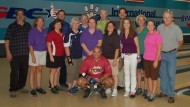Deaflympics tryouts being held at ITRC
August 18, 2012

ARLINGTON, Texas – A two-day tryout that will help decide the bowlers who will represent the United States at the 2013 Deaflympics began Saturday at the International Training and Research Center in Arlington.
The participants are bowling on World Tenpin Bowling Association (WTBA) lane conditions and the tryouts will play a big part in determining the team that will represent the United States at the 2013 Deaflympics in Sofia, Bulgaria. The Deaflympics were first held in 1924 in Paris.
“It was recommended we come here because we could get the WTBA lane patterns and it would be a good experience for the bowlers, so they can see what they are getting into when they compete in international competition,” said Ed Abakumoff, chairperson of the Ad-Hoc committee on bowling for the USA Deaf Sports Federation (USADSF).
Abakumoff was a member of the U.S. team that won the team title at the 2001 Deaflympics in Rome. That team swept all the men’s events in 2001 but Abakumoff said the tournament was conducted on a house shot. Four years later in Melbourne, Australia, the tournament used WTBA lane patterns and he said from that point on, he knew future tryouts would need to be conducted on more challenging patterns.
On Saturday, the competitors bowled six games on the Stockholm (34 feet) pattern and six games on the Seoul (39 feet) pattern. They will return Sunday for six more games on the London (44 feet) pattern.
The USADSF, the national organization for deaf sports and a member of the United States Olympic Committee as a community-based multisport organization, is waiting to see how many bowlers will be needed next summer.
The 2013 Deaflympics originally was awarded to Athens but the organizers could not raise the funds needed due to the economic crisis. Bulgaria stepped in and Sofia will serve as host of the event for the second time, the first coming in 1993.
In the past, the Deaflympics required six bowlers per team (men and women) but the number of members on each team may be reduced. The International Committee of Sports for the Deaf (ICSD), the international governing body that is recognized by the International Olympic Committee (IOC) as the sole organization of sporting events for deaf athletes, is expected to finalize the format soon.
Abakumoff said while past games have included competition in singles, doubles, trios, team and Masters, there has been discussion of reducing the competition for 2013 to singles, doubles and Masters.
The participants are bowling on World Tenpin Bowling Association (WTBA) lane conditions and the tryouts will play a big part in determining the team that will represent the United States at the 2013 Deaflympics in Sofia, Bulgaria. The Deaflympics were first held in 1924 in Paris.
“It was recommended we come here because we could get the WTBA lane patterns and it would be a good experience for the bowlers, so they can see what they are getting into when they compete in international competition,” said Ed Abakumoff, chairperson of the Ad-Hoc committee on bowling for the USA Deaf Sports Federation (USADSF).
Abakumoff was a member of the U.S. team that won the team title at the 2001 Deaflympics in Rome. That team swept all the men’s events in 2001 but Abakumoff said the tournament was conducted on a house shot. Four years later in Melbourne, Australia, the tournament used WTBA lane patterns and he said from that point on, he knew future tryouts would need to be conducted on more challenging patterns.
On Saturday, the competitors bowled six games on the Stockholm (34 feet) pattern and six games on the Seoul (39 feet) pattern. They will return Sunday for six more games on the London (44 feet) pattern.
The USADSF, the national organization for deaf sports and a member of the United States Olympic Committee as a community-based multisport organization, is waiting to see how many bowlers will be needed next summer.
The 2013 Deaflympics originally was awarded to Athens but the organizers could not raise the funds needed due to the economic crisis. Bulgaria stepped in and Sofia will serve as host of the event for the second time, the first coming in 1993.
In the past, the Deaflympics required six bowlers per team (men and women) but the number of members on each team may be reduced. The International Committee of Sports for the Deaf (ICSD), the international governing body that is recognized by the International Olympic Committee (IOC) as the sole organization of sporting events for deaf athletes, is expected to finalize the format soon.
Abakumoff said while past games have included competition in singles, doubles, trios, team and Masters, there has been discussion of reducing the competition for 2013 to singles, doubles and Masters.





